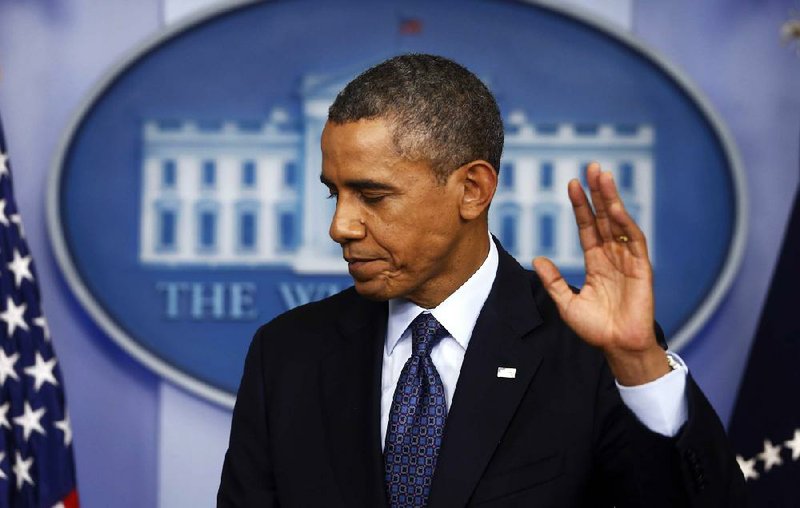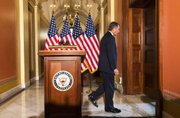WASHINGTON - President Barack Obama said Tuesday that the U.S. economy risks a “very deep recession” if Congress doesn’t raise the $16.7 trillion debt ceiling.
RELATED ARTICLES
http://www.arkansas…">Shutdown seen slowing oil suithttp://www.arkansas…">VA furloughs some 7,000
Speaking at a news conference at the White House, Obama said he’s willing to talk to Republicans about anything, including changes to his healthcare law, once lawmakers end the partial government shutdown and increase the country’s borrowing authority.
“No American president would deal with a foreign leader like this,” he said. “Most of you would not deal with either co-workers or business associates in this fashion. We shouldn’t be dealing this way here in Washington.”
The partial shutdown, which began Oct. 1, has shuttered government services such as Head Start preschool programs and national parks and furloughed federal employees. Other functions, such as mail delivery and Social Security benefits, are continuing.
Republicans are insisting on changing the 2010 Patient Protection and Affordable Care Act, while Obama refuses to engage in discussions about tying policy conditions to reopening the government or raising the debt limit.
The U.S. will run out of borrowing authority on Oct. 17 and will have about $30 billion in cash after that. The country would be unable to pay all of its bills, including benefits, salaries and interest, sometime between Oct. 22 and Oct. 31, according to the Congressional Budget Office.
Obama didn’t answer directly when asked whether he planned to make sure bondholders get paid first. He said that there would be consequences for the economy and the creditworthiness of the U.S. if the government missed other payments such as those to Social Security beneficiaries.
If an individual doesn’t make required payments, the president said, “You’re just a deadbeat and you can anticipate that will hurt your credit.”
Obama also expressed openness to short-term measures for funding the government or raising the debt ceiling as long as policy conditions aren’t attached.
Obama phoned House Speaker John Boehner earlier Tuesday to urge him to allow a House vote on a budget bill without conditions, and Boehner called on the president to come to the negotiating table to resolve the spending standoff that has shuttered the government for eight days.
“I had a phone call with the president of the United States this morning,” Boehner said at a news conference at the Capitol, after Obama’s news conference. “I will say it was a pleasant conversation, although I have to say I was disappointed that the president refuses to negotiate.”
He added: “When it comes to the debt limit, I agree with the president: We should pay our bills. I didn’t come here to shut down the government. I certainly didn’t come here to default on our debt.”
The speaker’s office said the call broke no new ground. “The president called the speaker again today to reiterate that he won’t negotiate on a government funding bill or debt limit increase,” said Brendan Buck, a spokesman for Boehner.
The competing pushes by the president and Boehner came after a private meeting of House Republicans produced no new offers to resolve the spending stalemate and no plan for what to do about the the approach of next week’s borrowing limit for the federal government.
Instead, they emerged from their meeting with a united stance: They will make no move to resolve either crisis until Obama extends an olive branch.
“The American people are watching an unwillingness by one side to negotiate and compromise,” Rep. Tom McClintock, R-Calif., said Tuesday. “They are watching utterly vindictive actions by the administration to intensify the pain of the shutdown, and I think they are watching the collapse of the administration’s signature program, Obamacare.”
Republicans on Tuesday put forth their latest effort to pressure Democrats to come to the table, approving on a 224-197 vote a bipartisan, bicameral committee to convene and address the impasse over the shutdown and the debt ceiling. The four representatives from Arkansas, all Republicans, supported the measure.
Democrats dismissed the idea as another ploy by Republicans to demand unreasonable concessions in exchange for reopening the government and raising the debt limit.
Meanwhile, Senate Majority Leader Harry Reid called all 100 senators to the floor for a debate Tuesday afternoon.
Senate Democrats planned to introduce a bill that would raise the debt ceiling for a year, said Sen. Charles Schumer, D-N.Y. They are planning a test vote before the end of this week.
To succeed, they’ll need support from at least six Republicans on procedural votes. They have received backing from one Republican, while several others haven’t ruled out the possibility.
Still to be determined is whether House Republicans will consider a vote to raise the debt ceiling this week or wait for the Senate to act, said two Republican congressional aides, speaking on condition of anonymity to discuss party strategy.
If all Senate Democrats along with six Republicans vote for giving Obama authority, they could send a debt-limit increase without policy conditions to the Republican-controlled House early next week. That would put pressure on Boehner, who opposes a clean debt-limit bill.
Republican Sen. Mark Kirk of Illinois said he will support a clean debt-limit increase. About a half-dozen others - including Lisa Murkowski of Alaska, John McCain of Arizona and Susan Collins of Maine - kept open the option of voting for a debt-ceiling increase without conditions on helping one pass.
None of the proposals being floated has been embraced by both parties and all face long odds.
In the absence of an agreement, the House has been passing separate funding bills for parts of the government, including the National Institutes of Health and national parks. Obama and Reid have rejected those measures.
The House on Tuesday expressed anger that families of fallen U.S. military personnel are being denied death benefits during the shutdown, and readied a fix.
Boehner blasted the Obama administration for withholding the payments, and said Congress gave the Defense Department broad authority to continue paying bills such as the death payments in a law passed just before the government shut down. He said the House would address the problem today, and he called on Obama to sign the bill into law.
The House approved legislation Tuesday to pay for a resumption of Head Start, the preschool program for disadvantaged children. The vote was 248-168. Arkansas’ representatives all voted in favor of the measure.
The House also voted 420-0 to make sure federal workers on the job don’t miss next week’s regularly scheduled paychecks on Tuesday.
Economists on Tuesday continued to urge the lawmakers to resolve the overall crisis.
Bruce Josten, chief lobbyist at the U.S. Chamber of Commerce, said in a statement that the spending bill and the debt-limit increase are “must-pass” bills “to avoid inflicting substantial and enduring damage on the U.S. economy.”
But some Republicans said the Treasury is receiving ample tax revenue everyday to pay off creditors and avoid a default. Additional government services might close and contracts might be suspended as the administration prioritizes debt servicing, they said, but an actual crisis is far off.
“There’s no way to default,” Rep. Justin Amash, R-Mich., said Tuesday. “There’s enough money coming into the Treasury to pay interest and to roll over principal.”
While the Treasury expects to have $30 billion of cash on hand on Oct. 17, that money will be quickly exhausted in paying incoming bills, given that the government’s payments can amount to $60 billion on a single day, Treasury Secretary Jacob Lew said.
There is no option to prevent default “if we don’t have enough cash to pay our bills,” he said.
Also Tuesday, the CIA announced it was bringing back some furloughed employees out of concern for national security. In a statement, CIA Director John Brennan said those being recalled were necessary to the agency’s core missions of foreign intelligence collection, analysis, covert action and counterintelligence.
Meanwhile, the Centers for Disease Control and Prevention said Tuesday that it had called back several data analysts and epidemiologists whose jobs are to track down and respond to food-borne illnesses across the country, in part to help with an ongoing salmonella outbreak that has sickened nearly 300 people.
Information for this article was contributed by Kathleen Hunter, Julianna Goldman, Richard Rubin, Kasia Klimasinska, Sara Forden, Phil Mattingly, Mike Dorning, James Rowley, Margaret Talev, Michelle Jamrisko, Jeanna Smialek, Sandrine Rastello, Chris Strohm, Roxana Tiron, Michael C. Bender, Pratish Narayanan, Stephen Kirkland, Daniel Kruger, Susanne Walker, Erik Schatzker, Stephanie Ruhle, Christine Maurus and Keiko Ujikane of Bloomberg News; by Jackie Calmes and Jonathan Weisman of The New York Times; by Bradley Klapper, Charles Babington, David Espo, Andrew Taylor, Alan Fram, Martin Crutsinger, Julie Pace, Donna Cassata and staff members of The Associated Press; and by Brady Dennis of The Washington Post.
Front Section, Pages 1 on 10/09/2013



